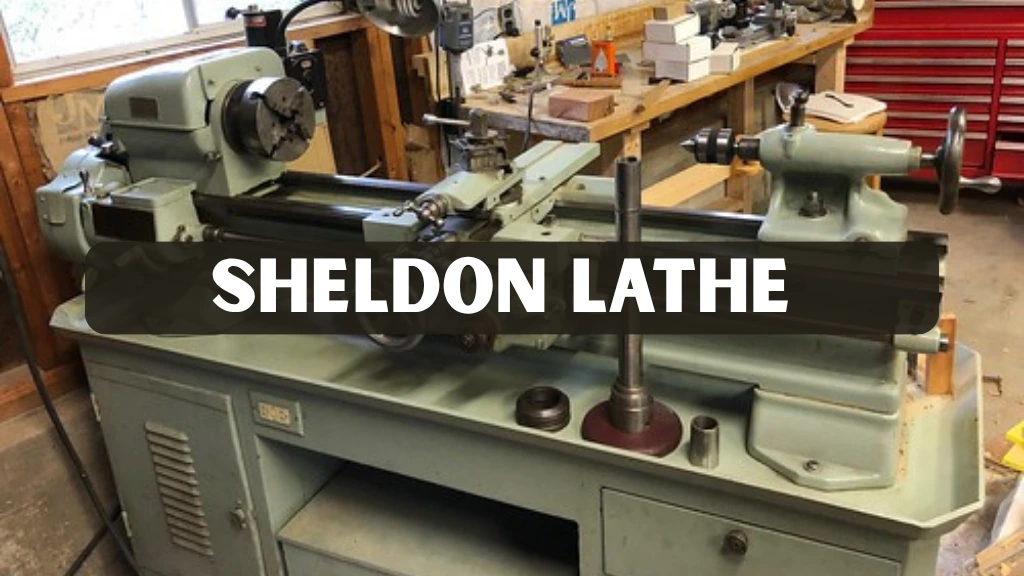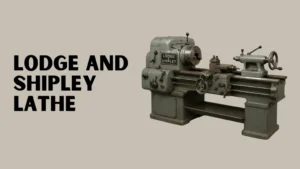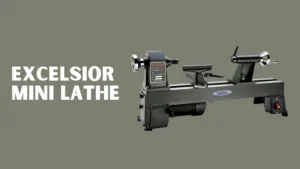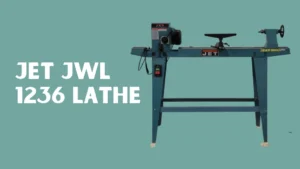The Sheldon Lathe is a highly respected machine tool known for its precision, durability, and adaptability in both hobbyist and professional settings. Over decades, it has earned a strong reputation in metalworking and woodworking communities worldwide. Experienced machinists value its stable construction and reliable performance for accurate turning and threading tasks. Trusted reviews and long-term user feedback confirm its effectiveness in a variety of workshop environments.
These machines have evolved to serve both compact home workshops and large industrial facilities, offering unmatched versatility. Beginners and professionals alike can achieve high-quality results thanks to thoughtful engineering and consistent build quality. The robust design, technical specifications, and ease of maintenance reflect the expertise behind its development. Understanding these features helps users make informed decisions and ensures confidence in long-term performance.
What is a Sheldon Lathe
A Sheldon Lathe is a precision machine tool built to turn, shape, and thread metals, wood, and other materials with exceptional accuracy. Designed for long-term performance, these machines are available in both manual and CNC-ready configurations. Their robust construction minimizes vibrations during high-speed operations, ensuring consistent and reliable results. Experienced machinists and hobbyists alike rely on this tool for precision and durability in their projects.
The cast-iron construction combined with precision-ground bed ways provides the stability needed for both small-scale and industrial applications. Over time, it has proven to be a trusted tool for custom fabrication, automotive restoration, and manufacturing of detailed components. Reviews from professional workshops confirm its reliability and effectiveness. Understanding its features and build quality helps users make informed decisions for long-term performance.
History and Evolution of Sheldon Machine
The lathe was first introduced in the mid-20th century, with the R-Series quickly becoming a benchmark for precision and reliability. Early models emphasized durability, enabling machinists to perform intricate turning and threading tasks with consistent results. Over time, variable-speed motors and improved tooling compatibility were added to meet evolving workshop needs. CNC-ready configurations later allowed users to integrate automated solutions, bridging traditional techniques with modern technology.
This evolution demonstrates the expertise and innovation behind the brand, making it a trusted name in both hobbyist and professional machining communities. Its continued adaptation to technological advancements reflects a commitment to quality and performance. Workshops and users worldwide rely on these machines for long-term accuracy and efficiency. Understanding this history provides confidence in the machine’s capabilities and its enduring reputation.
Sheldon Lathe Models and Specifications
Sheldon lathes come in various models to meet different needs, ranging from compact mini-lathes for hobbyists to heavy-duty industrial models for larger workshops. Understanding the differences between these models is essential for selecting the right lathe for your specific application.
Sheldon R-Series Lathe
The R-Series is one of the most popular lines, designed for precision turning, threading, and general-purpose metalworking. These lathes feature a swing over the bed of ten to twelve inches, making them suitable for medium-sized workpieces. The distance between centers ranges from twenty to forty inches, providing flexibility for a wide variety of projects. With a spindle bore of one to 1.25 inches, they are compatible with most standard chucks and accessories.
Motor options typically range from one to two horsepower, with single or three-phase configurations available, and speeds vary from fifty to 2,500 RPM. Constructed from heavy cast iron and weighing between 600 and 900 pounds, the R-Series ensures stability during operations. Its durability and versatility make it a reliable choice for both professional workshops and hobbyist settings. Many machinists appreciate its consistent performance and long-term reliability across diverse applications.
Sheldon Bench-Top Lathe
Bench-top models are designed for hobbyists or small workshops that need precision machining in limited spaces. These lathes feature a swing over the bed of six to eight inches and a distance between centers of twelve to eighteen inches, making them well-suited for smaller parts and components. Spindle bores range from 0.75 to one inch, accommodating a variety of standard chucks and tooling. The combination of compact size and precision ensures reliable results even in tight workspaces.
Motor options typically fall between 0.5 and one horsepower, with speeds ranging from 100 to 2,000 RPM, allowing accurate turning and threading operations. Weighing between 150 and 250 pounds, these machines are stable enough for placement on a sturdy workbench yet remain manageable in small workshops. Despite their smaller dimensions, they maintain the durability and reliability expected from the Sheldon brand. Many hobbyists and small-scale producers trust these lathes for consistent, high-quality results.
Sheldon Industrial Lathe
Industrial models are built for high-volume operations and heavy-duty use in professional workshops. They typically feature a swing over the bed of 14 to 16 inches and a distance between centers of fifty to sixty inches, making them suitable for large workpieces. The spindle bore ranges from 1.5 to 2 inches, supporting heavy-duty chucks and tooling for demanding tasks. Their robust design ensures stability and consistent performance during extended operations.
Motors generally range from three to five horsepower, requiring three-phase power, with speeds adjustable from thirty to 2,000 RPM depending on the material and operation. Many industrial models can be retrofitted with CNC kits, enabling automated and programmable machining for complex projects. Weighing between 1,500 and 2,500 pounds, these machines provide the strength and reliability needed for professional workshops. Their combination of size, durability, and versatility makes them a trusted choice for precise and efficient production.
Sheldon Mini-Lathe
Mini-lathes are compact machines ideal for micro-machining, model-making, and educational purposes. They typically feature a swing over the bed of four to six inches and a distance between centers of eight to twelve inches, making them perfect for small components. The spindle bore ranges from 0.5 to 0.75 inches, accommodating fine tooling, while motor power usually falls between 0.25 and 0.5 horsepower. Their design allows precise control, which is essential for delicate operations in both learning and hobby projects.
Speeds range from 50 to 2,500 RPM, providing flexibility for various materials and tasks. Weighing between fifty and 100 pounds, these machines are portable and can easily fit on a small workbench or table. Despite their compact size, mini-lathes deliver accurate turning and threading, making them reliable for students, hobbyists, or anyone learning machining fundamentals. Their precision and ease of use ensure consistent results even in small-scale projects.
Features of Sheldon
The features of this lathe are a major reason for its popularity among machinists of all levels. High-strength cast-iron construction reduces vibration, ensuring smooth and precise operations even during demanding tasks. The bed and carriage are heat-treated and ground, allowing the tool to move consistently across the workpiece. Precision-machined spindles accommodate a wide range of chucks and tooling, enhancing versatility for different machining applications.
Variable-speed motors allow operators to adjust performance for various materials and operations. Tooling compatibility includes three-jaw and four-jaw chucks, threading kits, collets, and faceplates, giving users flexibility for diverse projects. Some models also feature quick-change tool posts, reducing setup time and improving workflow efficiency. These combined features make the lathe suitable for detailed work, repetitive production, and complex threading operations in both hobbyist and professional settings.
Applications
These lathes are versatile machines used across multiple industries and workshop settings. Hobbyists rely on them to create miniature parts, model kits, and custom components for personal projects. Their precision and stability make them ideal for detailed work, even in home workshops. Users consistently report high satisfaction with the performance and reliability of these machines.
In automotive applications, the lathes are frequently used to produce engine components, restore vintage parts, and fabricate custom fixtures. Professional machinists value their ability to maintain tight tolerances while performing complex turning and threading operations. This precision ensures that every component fits and functions correctly, reducing the need for post-production adjustments.
Industrial workshops also benefit from their adaptability in small-batch production, prototyping, and precision machining. These machines can work with a variety of materials, including metals, plastics, and softer woods, allowing machinists to tackle diverse projects. Their combination of accuracy, reliability, and versatility makes them indispensable tools for both educational and professional environments.
Real-World Examples
These lathes are widely used across hobbyist, educational, and professional workshops due to their precision and versatility. Automotive restoration shops often rely on them to fabricate engine components, produce custom bushings, or repair vintage parts with accuracy. One Midwest workshop uses a bench-top model to create custom gear shafts for classic car rebuilds. Its compact design allows detailed work without taking up excessive space, while precision ensures components fit perfectly, minimizing errors and post-production adjustments.
Educational institutions and industrial workshops also benefit from these machines. Technical colleges use mini-lathes to teach students the fundamentals of turning, threading, and tooling selection, providing hands-on experience with professional-grade equipment. Small-batch manufacturers rely on industrial models to produce components such as aluminum brackets for robotics or custom metal fittings. The combination of stability, durability, and accuracy allows machinists to achieve consistent, high-quality results, demonstrating their practical value in real-world applications.
Pros and Cons
These sheldon machine offer numerous advantages that make them highly valued by hobbyists, students, and professional machinists. They are exceptionally durable, maintain accuracy over decades, and support a wide range of tooling for versatile operations. Smooth and precise performance allows users to complete detailed tasks efficiently, whether in a home workshop or industrial setting. Proper maintenance further enhances their longevity, providing significant long-term value.
However, some considerations should be noted. Heavier industrial models require dedicated workshop space and can be difficult to move, while the initial cost is higher than standard lathes, particularly for R-Series and industrial versions. Manual models may require adjustments for advanced threading or highly precise operations, which can be challenging for beginners. Despite these limitations, their combination of precision, reliability, and versatility generally outweighs the drawbacks, making them a dependable choice for a wide range of applications.
Maintenance Tips
Maintaining a Sheldon machine is essential for ensuring longevity and consistent performance. Cleaning the lathe after every use to remove metal shavings prevents damage to moving parts and reduces wear. Regular lubrication of gears, bearings, and slides with recommended oils keeps operations smooth and reduces the risk of breakdowns. Periodic inspection of belts, gears, and bearings can help identify wear before it becomes a problem. Calibration of the tool post and spindle ensures accurate machining and maintains consistent results over time. By incorporating these maintenance practices, users can extend the life of their Lathe, maintain its precision, and enjoy years of reliable operation.
Conclusion
The Sheldon Lathe continues to be a reliable and versatile tool for machinists at all levels. Its durable construction, wide range of compatible tooling, and potential for CNC adaptation make it an excellent investment for workshops. By understanding its history, models, specifications, features, and maintenance requirements, users can select the right model and achieve precise, high-quality results in their projects. Whether you are creating custom automotive parts, working on hobbyist models, or producing industrial components, the Sheldon offers the precision and reliability required for a wide variety of machining tasks.
FAQs
Is the Sheldon machine suitable for beginners?
Yes, many models, particularly bench-top and mini-lathes, are beginner-friendly. They offer precision control while providing an easy learning curve for basic machining skills.
Can Sheldon be upgraded to CNC?
Certain models, especially industrial and R-Series lathes, can be retrofitted with CNC kits. This allows automated, programmable operations for advanced machining projects.
What materials can be machined on a Sheldon machine?
These lathes are versatile and capable of working with metals such as steel, aluminum, and brass, as well as plastics and softwoods. Proper tooling and speed adjustments are essential for each material type.
How long does a Sheldon machine typically last?
With proper maintenance, a Sheldon machine can last several decades, making it a long-term investment for both hobbyists and professional workshops.
What is the difference between R-Series and Mini-Lathe?
R-Series models are larger and built for heavy-duty operations, while Mini-Lathes are compact, portable, and ideal for small projects, educational purposes, or hobbyist use.




